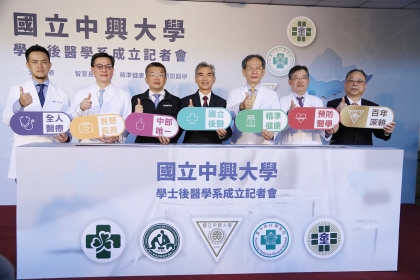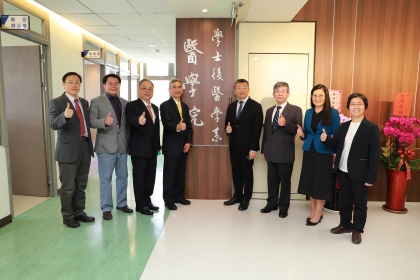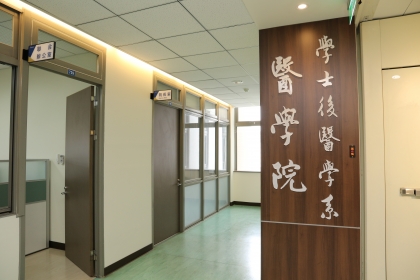National Chung Hsing University College of Medicine was officially established on August 1st
2022-08-01
興新聞張貼者
Unit秘書室
1,746
On the 1st day of August 2022, National Chung Hsing University officially established College of Medicine, which includes the Department of Post Baccalaureate Medicine, Graduate Institute of Biomedical Engineering, Graduate Institute of Biomedical Sciences, Ph.D. program in Tissue Engineering and Regenerative Medicine, and Ph.D. Program in Microbial Genomics.
National Chung Hsing University is the only national university which successfully strives to establish a new Department of Post Baccalaureate Medicine in central Taiwan this year, At the same time, the Department cooperates with Taichung Veterans General Hospital, Changhua Christian Hospital, Tungs' Taichung Metro Harbor Hospital and Show Chwan Memorial Hospital. Providing internship fields, the four major hospitals will assist in professional clinical training.
The Department of Post Baccalaureate Medicine, NCHU, as a very popular department, attracted a total of 597 applicants among whom 23 state financed students were recruited with an admission rate of about 3.85%. The admitted freshmen include panel factory engineers, social workers, medical laboratory scientists, and those university graduates who aspire to serve in remote areas.
In addition to cultivating medical professional ability in the professional compulsory courses, multi-faceted elective courses are specially designed as three modules: holistic medical care, intelligent medical care, and precision medicine, to help students explore in depth the development of the different fields.
As President Fuh-Sheng Shieu of National Chung Hsing University said, establishment of the College of Medicine is a vocation, which brings structural changes to the future development of National Chung Hsing University. There are only two universities in Taiwan which are able to promote "Health Integration " that includes medical education in the three fields of human health, animal health, and environmental health. One is National Taiwan University, and the other is National Chung Hsing University. Especially with the full support of the four hospitals, it is believed that National Chung Hsing University will create a new model of medical education in Taiwan.
National Chung Hsing University is the only national university which successfully strives to establish a new Department of Post Baccalaureate Medicine in central Taiwan this year, At the same time, the Department cooperates with Taichung Veterans General Hospital, Changhua Christian Hospital, Tungs' Taichung Metro Harbor Hospital and Show Chwan Memorial Hospital. Providing internship fields, the four major hospitals will assist in professional clinical training.
The Department of Post Baccalaureate Medicine, NCHU, as a very popular department, attracted a total of 597 applicants among whom 23 state financed students were recruited with an admission rate of about 3.85%. The admitted freshmen include panel factory engineers, social workers, medical laboratory scientists, and those university graduates who aspire to serve in remote areas.
In addition to cultivating medical professional ability in the professional compulsory courses, multi-faceted elective courses are specially designed as three modules: holistic medical care, intelligent medical care, and precision medicine, to help students explore in depth the development of the different fields.
As President Fuh-Sheng Shieu of National Chung Hsing University said, establishment of the College of Medicine is a vocation, which brings structural changes to the future development of National Chung Hsing University. There are only two universities in Taiwan which are able to promote "Health Integration " that includes medical education in the three fields of human health, animal health, and environmental health. One is National Taiwan University, and the other is National Chung Hsing University. Especially with the full support of the four hospitals, it is believed that National Chung Hsing University will create a new model of medical education in Taiwan.




